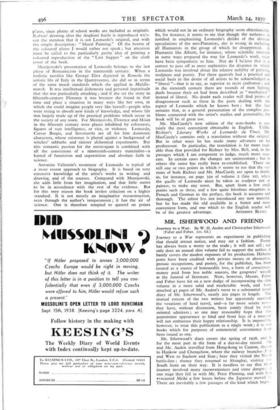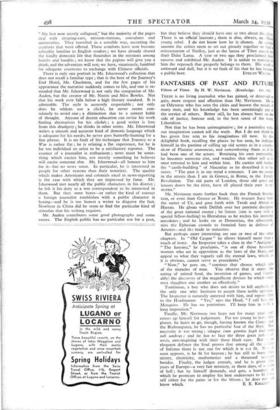MR. ISHERWOOD AND FRIEND
Journey to a War. By W. H. Auden and Christopher Isherwood. (Faber and Faber. I2S. 6d.) , Yourney to a War represents an experiment in publishing that should attract notice, and may set a fashion. Poetry has always been a worry to the trade ; it will not sell ; not only does an annual slim volume fail to support the author, it barely covers the modest expenses of its production. Hitherto poets have been credited with private means or alternative, prosaic occupations, and poetry, for the publisher, has been treated as a source of honourable loss, a form of conscience- money paid from less noble sources, the gangsters' wreath at the funeral of literature. Now, however, Messrs. Faber and Faber have hit on a new dodge of incorporating the slim volume in a more solid and marketable work, and have attached 43 pages of Mr. Auden's verse to a substantial travel diary of Mr. Isherwood's, nearly 200 pages in length. The mutual esteem of the two writers has apparently survived the vexations of hard travel, and—a far more severe test— they have, without dissension, been jointly feted by their oriental admirers ; so one may reasonably hope that this pantomime appearance as hind and front legs of a mormer will not embarrass their happy relationship. It is impossible, however, to treat this publication as a single work ; it is two books which for purposes of commercial convenience have been issued as one.
Mr. Isherwood's diary covers the spring of 1938, and IS for the most part in the form of a day-to-day record. lie and Mr. Auden travelled from Hong-kong to Canton, thence to Hankow and Chengchow, where the railway branches E and West to Suchow and Sian ; here they visited the Noi h battle-line ; thence they returned to Shanghai, visiting ti'e South front on their way. It is needless to say that thc:r journey involved many inconveniences and some danger ; nt one stage they fell in with Mr. Peter Fleming, and with hi:n evacuated Meiki a few hours before the Japanese moved. In There are inevitably a few passages of the kind which begin.
"My feet now utterly collapsed," but the majority of the pages deal with sleeping-cars, mission-stations, consulates and universities. They travelled in a sensible way, accepting the comforts that were offered. These comforts have now become tolerably familiar to English readers ; we have already shared the kindly domestic life that flourishes in the missions among bombs and bandits ; we know that the papists will give you a drink, and the adventists will not; we have, vicariously, fumbled for adequate courtesies to exchange with Chinese officials.
There is only one portrait in Mr. Isherwood's collection that does not recall a familiar type ; that is the host of the Journey's End Hotel, Mr. Charleton, and for the few pages of his appearance the narrative suddenly comes to life, and one is re- minded that Mr. Isherwood is not only the companion of Mr. Auden, but the creator of Mr. Norris and Miss Bowles. Not that his work ever falls below a high literary standard. It is admirable. The style is austerely respectable ; not only does he seldom use a cliché, he never seems con- sciously to avoid one ; a distinction due to a correct habit of thought. Anyone of decent education can revise his work finding alternatives for his clichés ; a good writer is free from this drudgery ; he thinks in other terms. Mr. Isherwood writes a smooth and accurate kind of demotic language which is adequate for his needs; he never goes butterfly-hunting for a fine phrase. It is no fault of his technique that 7ourney to a War is rather flat ; he is relating a flat experience, for he is far too individual an artist to be a satisfactory reporter. The essence of a journalist is enthusiasm ; news must be some- thing which excites him, not merely something he believes will excite someone else. Mr. Isherwood—all honour to him for it—has no news sense. In particular, he is interested in people for other reasons than their notoriety. The quality which makes Americans and colonials excel in news-reporting is the ease with which they are impressed by fame. Mr. Isherwood met nearly all the public characters in his district ; he felt it his duty as a war correspondent to be interested in them. But they were bores—or rather the kind of contact a foreign journalist establishes with a public character is boring—and he is too honest a writer to disguise the fact. Nowhere in China did he seem to find the particular kind of stimulus that his writing requires.
Mr. Auden contributes some good photographs and some verses. The English public has no particular use for a poet, but they believe they should have one or two about the place. There is an official laureate ; there is also, always, an offieri young rebel. I do not know how he is chosen. At certall seasons the critics seem to set out piously together to find a reincarnation of Shelley, just as the lamas of Tibet search for their Dalai Lama. A year or two ago they proclaimed their success .and exhibited Mr. Auden. It is unfair to transfer to him the reproach that properly belongs to them. His work tr awkward and dull, but it is no fault of his that he has become















































 Previous page
Previous page